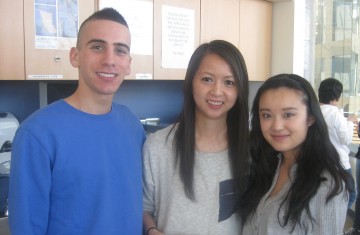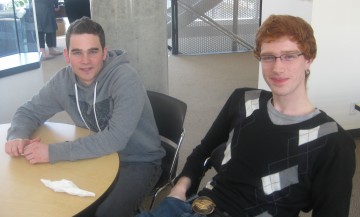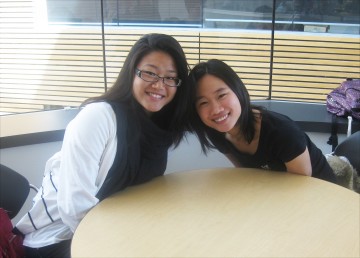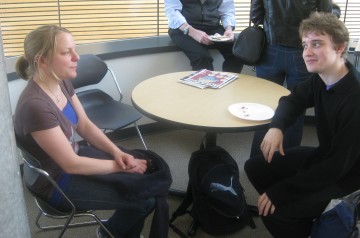As the undergraduate and medical students wind up their studies this May, the CBR is happy to welcome them into our labs and clinics. These opportunities, available through unrestricted educational grants from Bayer Inc., CSL Behring, Nikon, Novartis, Novo Nordisk, Pfizer and Roche provide these future scientists and clinicians with valuable experiences that will guide them into important career decisions. In addition to the exciting projects in which they will actively participate, they will also be treated to tours of various research and clinical facilities, present their findings on August 16 at the Annual CBR Research Day, and hopefully they will also make some long-lasting friends at the CBR!
Here are some of the projects that will be tackled this summer…..
Patients with all types of cancer are at increased risk of venous thromboembolism. Leena Chen will examine bleeding rates and thrombotic complications in patients who have undergone bone marrow transplantation for leukemia, in attempts to providing insights into the optimal use of prophylaxis for venous thromboembolism.
 Mutations in cathepsin F are implicated in the pathogenesis of the neuronal disorder, lipofuscinosis. To better understand the mechanisms, Steven Zbarsky will generate one of these mutant forms of cathepsin F and express it in Pichia pastoris.
Mutations in cathepsin F are implicated in the pathogenesis of the neuronal disorder, lipofuscinosis. To better understand the mechanisms, Steven Zbarsky will generate one of these mutant forms of cathepsin F and express it in Pichia pastoris.
James Ross will gain experience on 2 projects, the first involving the design and synthesis of chelating ligands for 68Ga, an attractive isotope for diagnostic nuclear medicine, and the second involving the design and synthesis of Cu(II) and Zn(II) chelators, and their potential application for Alzheimer’s disease.
Mitochondrial DNA (mtDNA) mutations are linked to aging and age related diseases. Adam Ziada will participate in studies using a novel assay that relies on next generation sequencing to measure mtDNA mutations in blood and mouth swab samples from infants and aging individuals.
Establishing ideal storage conditions of red blood cells prior to transfusion to ensure patient safety remains an area of active interest. Debra Chen will participate in studies to assess the effect of changing red cell storage solutions using several in vitro parameters.
The project of Chia-Wei (Charlie) Kuan will focus on MHC Class II processing, the class that is specific to professional antigen presenting cells. He will be involved in the expression and purification of individual components of the antigen processing machinery, using these to reconstitute the entire process.
Next-generation sequencing may revolutionize HIV therapy because it enables laboratories to detect HIV genomes carrying drug resistance mutations at low frequencies. Heather Murray will help to evaluate which software applications best filter out indel errors and how they perform under a range of conditions. She will simulate next-generation sequence output using the software FlowSim and/or simulate the evolution of HIV sequences using other software such as HyPhy.
Iron overload from hematologic diseases or chronic red blood cell transfusions will cause damage to multiple organs. Fang-Chia Hsu (Joanne) will help evaluate the influence of conjugation of multiple copies of the iron chelator, desferroxamine (DFO) to different molecular weight highly biocompatible hyperbranched polyglycerol (HPG) polymers on their iron binding properties by spectroscopic methods.
 Myelodysplastic syndromes (MDS) are hematopoietic disorders associated with bone marrow failure and low blood counts. Using patient samples, So Ra Lee will help to validate candidate somatic disease-associated mutations identified in next generation sequencing, thereby providing insights into the molecular mechanisms of MDS.
Myelodysplastic syndromes (MDS) are hematopoietic disorders associated with bone marrow failure and low blood counts. Using patient samples, So Ra Lee will help to validate candidate somatic disease-associated mutations identified in next generation sequencing, thereby providing insights into the molecular mechanisms of MDS.
Endoglycan is a member of the CD34-family of sialomucins that is expressed by vascular and mucosal smooth muscle cells and several specific immune cells. To better characterize its function, Diana Canals Hernaez will help to analyze a knockout mouse in which a LacZ reporter cassette disrupts the functional gene expression.
Parker Jobin‘s project will be to aid in the investigation of the extracellular roles of a class of normal intracellular proteins (tRNA synthetases) with both known and possibly unknown extracellular moonlighting functions and to determine how these functions are regulated by matrix metalloproteinase (MMP) cleavage.
The correct functioning of many proteins relies on metals and metallochaperones. Using an E. coli expression system, Judy Tran will express and purify 4 metallochaperones that are believed to be involved in metal homeostasis in yeast, evaluate their metal-binding properties and initiate crystal structure studies.
Severe hemophilia is characterized by heterogeneity in clinical bleeding and joint damage that may in part be a function of the underlying molecular defect and factor replacement utilization patterns. Jenny Wang will perform a retrospective observational study to uncover these issues that may help in optimizing therapy.



Comments are closed, but trackbacks and pingbacks are open.